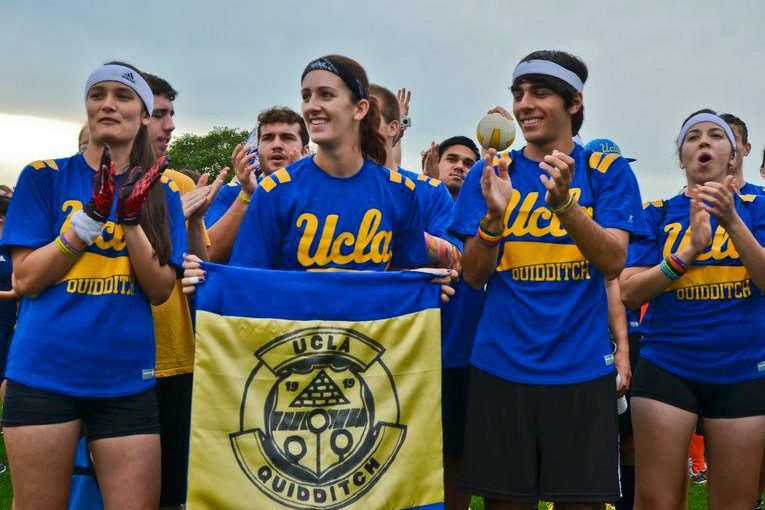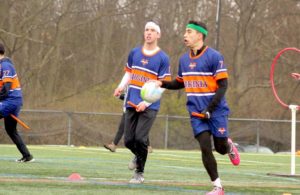- Rule, Britannia, no more?
- Unpopular Opinions: US Quadball Cup 2023
- Proven Contenders: University of Virginia
- Proven Contenders: Rutgers University
- Proven Contenders: University of Michigan
- Proven Contenders: Creighton University
- Different Perspectives: A Look Inside USA Ultimate
- Antwerp QC, Much of Belgian Core, Leaves Competitive Quidditch
March Madness: Sweet 16 Recap
By Ethan Sturm, Managerial Editor
Kerri Donnelly, Copy Editor
The Best College Program bracket finally created some excitement all the way across the board, with lower seeds scoring four victories and two winners garnering less than 60 percent of the vote. New York University scored perhaps the biggest win of the round, becoming the first program to earn the scalp of a No. 1 seed in Texas State University. Three No. 2 seeds fell, as well, with a group of solid No. 3 seeds well-equipped to upset them.
The final eight teams are composed of a series of programs that hail from the epicenters of modern quidditch. Three come from Texas, while two come from Boston, composing the geographical areas that have provided five of the last six USQ championship finalists and three of the last four MLQ Championship finalists. The remainder include UCLA, heavily responsible for the rise of the Los Angeles community team scene; NYU, responsible for much of modern New York quidditch; and University of Maryland, a Mid-Atlantic juggernaut.
Now we enter the Elite Eight, where juicy matchups abound. Texas takes on UCLA in a rematch of the World Cup VI final, which is to this day one of the most historic matches of all time. On the same side of the bracket, Texas A&M faces off with Emerson College in a battle of programs that are past their prime but have offered so much to the sport as we know it. Meanwhile, on the right side of the bracket, Tufts University takes on NYU in a battle of The Eighth Man editors and MLQ Commissioners and a rematch of the 2015 Northeast Regional Championship. Then we have Maryland up against Baylor University, who they last defeated at World Cup 8 in Swiss play.
Make your voice heard and vote for the quarterfinal matchups today.
No. 1 University of Texas over No. 5 Arizona State University
Result: 92 percent to 8 percent
The Longhorns train keeps rolling down the track, this time leaving a three-time West Regional Champion it its wake. Texas earned a clean sweep of The Eighth Man vote for a second straight round and dominated the public vote as well. Whether a team will eclipse 10 percent of the vote against them before the finals seems to be just about all of the drama matchups with one of the sport’s most dominant college programs on and off the pitch can muster.
No. 2 UCLA over No. 3 Ball State University
Result: 73 percent to 27 percent
A tough matchup to measure, featuring a program that made its entire mark way at the beginning of the relevant time period, but did so in a big way, and one that has consistently performed well over time, but never made the splash UCLA did. Ball State has slowly and steadily creeped up to three Team USA players, but that World Cup VI Bruins team alone has four. The Cardinals made a Final Four run at US Quidditch Cup 9, but still failed to make it as far as UCLA’s finals run at World Cup VI. Ball State volunteers have been vital to tournaments and organizations in recent years, but USQ Board Member Kara Levis has been game-changing. Put it all together, and UCLA edges out Ball State ever-so-slightly across the board.
No. 1 Texas A&M over No. 4 University of Miami
Result: 74 percent to 26 percent
Texas A&M continues to appear vulnerable due to its lack of top-end off-field contributions, but has found a consistently fortunate draw that has seen it go up against teams in a similar predicament. Miami has a proud history of success in the South and development of Team USA contributors, but it simply cannot compare to the Aggies’s absolute dominance in the World Cup VI and VII seasons, or even their re-emergence in recent years. Miami simply does not have the off-field contributions to close that gap, with much of David Moyer’s expansion and development work in Florida falling outside this bracket’s timeframe.
No. 3 Emerson College over No. 2 Bowling Green State University
Result: 68 percent to 32 percent
Bowling Green, a proud program with a lot of history in its own right, drew the unfortunate task of going up against Emerson in the Sweet 16. One could argue that Emerson, one of the sport’s oldest programs, has still not fully stretched its muscles, with no one bothering to overturn the true depth of its influence on the sport. This round, its influence on the community team scene has heavily focused on, with programs as widespread as the Lost Boys, the BosNYan Bearsharks and Quidditch Club Boston, each owing their existence to the program. Bowling Green has a long history of success in the Great Lakes, including two regional championships, but their successes on a micro level simply cannot stand up to those of Emerson on a macro one.
No. 5 New York University over No. 1 Texas State University
Result: 59 percent to 41 percent
NYU managed to defeat Texas State in large part due to the contributions of one single alumna: Amanda Dallas. While the New York rendition of the Bobcats also gave the sport John Gaffigan, US Quidditch Cup 9 champion Kyle Jeon and players across multiple MLQ squads, Texas State matches NYU’s on-pitch performances with its thriving intramural system, Consolation Cup and its World Cup VII finals run. And while alumna Beth Peavler is arguably one of the best tournament directors in the country, Texas State has no answer for Dallas’ reach and contributions across our eight regions and Canada. Texas State’s accomplishments may be more evenly distributed and versatile, but they are ultimately eclipsed by Dallas’s editorial, organizational and team leadership. The queen of quidditch has dethroned the top seed.
No. 3 Tufts University over No. 2 Boston University
Result: 69 percent to 31 percent
In a battle of largely individual accomplishments, including Ethan Sturm’s organizational and editorial creations and Hannah DeBaets’s Team USA appearance on the Tufts side and Max Havlin and Kedzie Teller’s game-changing performances on the field for Boston University, the difference may have come down to how the two squads matchup on the pitch. In the past four USQ seasons, Tufts is 8-1 in official games against Boston University and has collected a Northeast Regional Championship and two more Northeast Regional semifinal appearances. Boston University also has a regional crown in that time period, but failed to make it past the quarterfinals in any of the other three years. Those margins are definitely narrow, but when comparing two programs so intertwined this late into a very competitive bracket, they can make the difference.
No. 1 University of Maryland over No. 5 University of Kansas
Result: 85 percent to 15 percent
The Terrapins train keeps rolling down the track, this time leaving a Midwest Regional Champion it its wake. Maryland earned a clean sweep of The Eighth Man vote for a second straight round and dominated the public vote as well. Whether a team will eclipse 20 percent of the vote against them before the finals seems to be just about all of the drama matchups with one of the sport’s most dominant college program on and off the pitch can muster.
No. 3 Baylor University over No. 2 University of Michigan
Result: 54 percent to 46 percent
The closest matchup of the tournament to date, both the public and our staff were almost evenly split on this one, with both parties ever-so-slightly favoring the Baylor Bears in the end. While Michigan’s performance over time has been more consistent, the highs of the Baylor program, which include a Southwest Regional Championship and two World Cup Elite Eight runs, gave them the edge on-field. And while Michigan has more widespread contributions off the pitch—from Eric Wasser’s Lake Erie Elite and Detroit Innovators leadership to Andrew Axtell’s Quidstats app—Gabe Garcez is such a big factor in his own right that it kept Baylor competitive on the volunteer side. As long as he is still inherently changing the game of quidditch with his snitching, Baylor may keep turning this bracket on its head.




